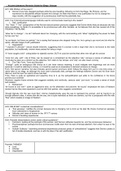A-Level Literature: Revision Guide for Elegy: Change
AO1: BIG IDEA(s) of the poem?
● Donne’s lover has changed (perhaps whilst he was travelling, following on from the Elegy: His Picture), and he
expresses his dissatisfied attitude towards this change. He feels that there is now justification for him to change his
ways morally, with the suggestion of a promiscuous motif that he potentially has.
AO2: Top 5 form/structure/language methods used to communicate meaning to the reader?
1. Self -Justification
“thy” “thee” “I” “me”- juxtaposition of the first and second person pronouns suggests that Donne thinks that just because she has
done something, he thinks it’s acceptable to be promiscuous with other females, as he believes that she has caused all of this
PASSING THE BLAME
“allow her to change” – he isn’t bothered about her changing, with the commanding verb “allow” highlighting the power he feels
he has over her
“so not teach, but force my opinion”- he is saying that because she stopped loving him, he is going to go round and do what he
wants, ultimate image of self -justification
2. Degradation
“””unprized if unknown”- sexual double entendre, suggesting that if a woman is still a virgin then she is not known to the male
population, but traditionally, women were praised for being a virgin
“If I have caught a bird”- colloquialism to objectify women, BUT he could be worried that other men will get his woman
“more hot, wily, wild”- rule of three, can be viewed as a compliment as the adjective “wily” conveys a sense of wittiness, but
could also be seen as a criticism as the adjective “hot” refers to her temper, and “wily” can also mean cunning
3. The Title, Form, Tone and Structure
“Change”- quite an ambiguous title choice as it can have various meaning: it could instigate new beginnings and be more
personal, it could be referring to money, or it could be used as an imperative to demand someone to change
Form- first person narrative, but also includes second person pronouns which follows the elegy form as it is one long verse. A
clever take on an elegy, as although his lover hasn’t physically died, perhaps the feelings between Donne and his lover have
died out, and the lover he used to know has died
Tone- there is quite an egotistical and assertive tone to it, as the self-justification just adds to his confidence in his future
promiscuous activities
Structure- regular rhyme scheme that suggests certainty and continuity, caesura used “;yet much,” to create a sense of doubt
and isolation
4. Entrapment
“be bound to one man”- quite an aggressive tone, as the alliteration and plosives “be bound” emphasize the lack of freedom
women had as they were expected to just be with their partner, also suggests commitment
“though Danuby into the sea must flow”- Donne metaphorically uses the sea to represent his woman, and by having to go
through different cities, it shows that like the sea, she is quite restricted as there are barriers, but this is juxtaposed with the verb
“flow” which creates an image of freedom
AO3: RELEVANT contextual considerations?
● “that apostasy”- belittles the woman because she is changing, but is ironic as his later life choice involved an apostasy
from Catholicism to Anglicanism
● Attitudes and views of women in the 16th/17th century
● Donne’s travelling experiences
AO5: Possible interpretations and/or useful critical quotations?
Feminism- looking at the portrayal of the woman, and Donne’s attitudes towards her, and his promiscuous behaviour
Psychoanalytical- perhaps Donne’s promiscuous motifs stem from his lack of female attention, from when he was on his
travels
Achsah Guibbory- “examining emotional experiences produces poetry of contradictions" suggests that Donne’s poetry is
full of double standards, and ties in with the idea of his self- justification
Possible THEMES?
● Love
● Change
● Degradation





